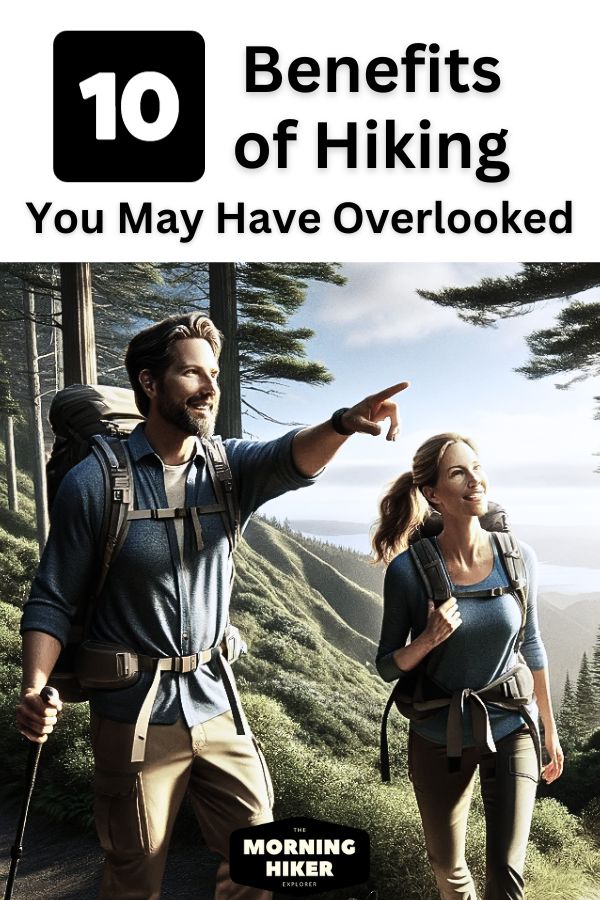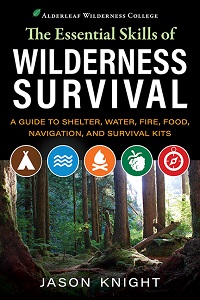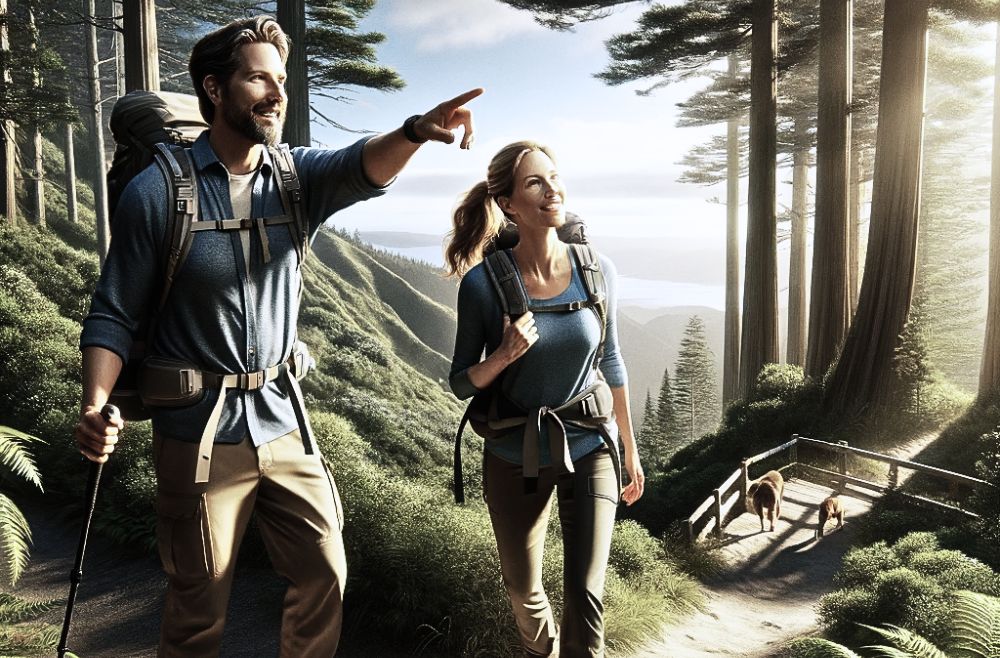Here are 10 benefits of hiking you may have overlooked. Maybe it’s time to strap on your backpack and hit the trails.
Venturing into the great outdoors by hiking is like turning the pages of a book filled with opportunities for personal growth and rejuvenation.
As you lace up your boots and hit the trail, you’re not just stepping into nature; you’re unlocking a treasure chest of health benefits that can improve your life in unexpected ways.
You’ll discover that the rhythmic cadence of your footsteps is not just a route to physical wellness, but also a journey that can boost your mental clarity and emotional balance.
Whether you’re in search of solitude or companionship, the mountains and valleys provide a sanctuary where the air is cleaner and your mind can wander freely.
However, the full range of hiking’s benefits is broader and more profound than you might think, and there’s a lot to learn about how these outdoor adventures can shape and enhance your overall well-being.

Here are 10 Benefits of Hiking You May Have Overlooked.
In This Article
#1: Enhances Cardiovascular Health
Hiking boosts heart health. It’s an activity that increases your heart rate, which in turn helps the cardiovascular system.
As you walk, your heart works harder, providing oxygen to muscles and the brain. This isn’t only exercise; it’s a step towards a healthier life, free from the risk of heart disease.
On the trail, every climb is a fight against high blood pressure and poor glucose tolerance. With every step, your heart grows stronger, your blood vessels more flexible. You’re doing more than leaving behind the everyday. You’re fighting a sedentary lifestyle that keeps many people inactive.
Keep hiking. With every step, you improve your heart health and break free from potential health issues.
#2: Strengthens Muscles
Embarking on a trail adventure strengthens more than just your spirit; it fortifies key muscle groups in your body. With each step on the uneven ground, your legs—quads, hamstrings, calves—and your glutes engage. Carrying a backpack, your arms and back join the workout.
Inclines offer a special benefit. The uphill battle is more than a mental test; it effectively builds your leg and core muscles. This exercise is about more than the immediate burn; it’s about crafting a body that can scale new peaks effortlessly.
Regular hiking not only boosts muscle strength but also increases bone density. This is essential for long-term health, as robust bones resist breaks and osteoporosis. Each trail you conquer bolsters your body’s foundation. Your muscles will be grateful for this natural gym as you continue your adventures, free from unnecessary setbacks.
#3: Promotes Weight Management
As you hit the trails, you’re not just enjoying the scenery—you’re also giving your calorie burn a significant boost. Hiking’s varied terrain means you’re constantly engaging different muscle groups, naturally regulating your appetite while managing your weight.
Caloric Burn Boost
Hitting the trails can significantly increase your calorie burn, aiding in effective weight management. The great outdoors offers more than just a sensory experience; it becomes an ideal backdrop for enhancing your workouts. As you walk over hills and uneven ground, your body engages in extra effort. This effort involves multiple muscle groups, which is beneficial for maintaining muscle and bone health. Additionally, this leads to an increased calorie expenditure.
Regular hiking is a natural way to exercise. It can help you lose weight and maintain that loss. The secret lies in maintaining a consistent caloric deficit. When you combine your hiking with a balanced diet, you may notice your body weight becoming more reflective of your adventurous nature.
The message is simple: keep moving and exploring. Let the trails guide you on your journey to fitness.
Natural Appetite Regulation
Hiking does more than just burn calories; it tunes into your body’s natural signals for hunger, aiding in weight management. The rhythm of your footsteps on the trail leads to a symphony of health benefits, one of which is the fine-tuning of your body’s appetite control.
Here’s a closer look at how this happens:
The balance of hormones within your body plays a pivotal role in managing hunger. Regular activities, such as hiking, create a harmony among these hunger hormones, which often leads to a decrease in the likelihood of overeating. Imagine your hormones as a choir, each one needs to hit the right note to create a beautiful melody – that’s what hiking does for your appetite.
Stabilizing blood sugar levels is another key advantage. Hiking acts like a steady hand, smoothing out the roller coaster of blood sugar peaks and valleys that lead to sudden, impulsive cravings. It’s akin to walking a tightrope with perfect balance, preventing the falls into temptation that can occur with fluctuating sugar levels.
Lastly, hiking gives your metabolism a significant lift. This isn’t just a temporary surge; it’s an ongoing elevation that helps maintain a healthy body composition. Think of it as stoking a furnace, keeping the fires of your metabolism burning efficiently long after the hike is over.
In essence, hiking is like a skilled conductor, orchestrating the complex symphony of your body’s appetite signals, leading to a more balanced and healthful lifestyle.
#4: Improves Mental Wellbeing
Hiking through nature can soothe anxiety and boost mental health. The experience of Shinrin-yoku, or forest bathing, taps into nature’s healing effects. This isn’t just lyrical; it’s backed by science. It helps improve mental wellbeing.
As you walk, your body reacts positively. The sun provides vitamin D, which can stabilize mood. Your increased body temperature from exercise may improve your sleep. A good night’s rest often makes you more resilient to stress.
The sight of greenery and the sound of the wind create a sense of calm. Stress reduces, and your mood lifts. Exercise makes you more receptive to hormones that trigger happiness. The trail isn’t only a path through the woods but also a step towards personal growth.
#5: Encourages Better Sleep
Encourages Better Sleep
The journey on the trail doesn’t just push us to grow personally; it also leads us to more restful nights. Hiking acts as a natural support for improving the quality and length of our sleep. When we step into the wilderness, our quest for adventure coincides with preparing ourselves for a restorative night’s rest.
The advantages of a day’s hike reach into the night, aiding in a sound sleep due to the physical activity and our bond with nature.
Here’s how the trails guide us to peaceful sleep:
Firstly, hiking helps regulate your sleep cycle. Being outdoors exposes you to natural daylight, which aligns your body’s internal clock with the rhythms of day and night. This ensures you feel sleepy as evening falls and refreshed with the morning sun.
Secondly, the tranquility of nature eases your mind. The serenity encountered in the wild diminishes stress and anxiety, common obstacles to both falling asleep and staying asleep throughout the night.
Lastly, the physical demand of navigating various terrains brings a satisfying kind of exhaustion. Your body naturally seeks rest to rejuvenate after the day’s exertions.
In essence, the trail is more than a path through the woods or up a mountain; it’s a journey to a better night’s sleep. While the cultural allure of hiking often lies in its connection to exploration and endurance, the subtle benefits, such as improved sleep, are equally significant. By syncing with nature’s clock, calming our thoughts, and using up our stored energy, we find ourselves in a better position to embrace the night’s slumber.
#6: Boosts Bone Density
As you lace up your boots and hit the trails, you’re not just treating your senses to nature’s splendors; you’re also fortifying your bones. Engaging in regular hikes takes advantage of gravity and resistance to strengthen your skeletal structure, helping ward off osteoporosis.
Carrying a backpack adds an extra challenge for your spine, reinforcing bone density with every step you take.
Strengthening Skeletal Structure
Regular hikes can significantly strengthen your bones and overall skeletal system. When you immerse yourself in the great outdoors, you’re not just seeking adventure; you’re also investing in your physical well-being. Here’s how trekking along trails can boost your skeletal strength:
- First, every step you take is a form of resistance, like a natural weightlifting session, which can build bone density. Just as a building’s foundation becomes sturdier with the right materials, your bones become more robust with each hike.
- Next, by hiking regularly, you slow down the loss of calcium in your bones. It’s like putting a steady brake on the natural wear and tear of your skeletal frame, thus preserving bone health.
- Finally, hiking works out a variety of muscle groups. This does more than just increase your strength; it creates a balance that acts like a shield for your bones, protecting your skeletal structure.
Keep moving and push your fitness levels higher; your bones will reap the rewards from the strength they derive from your commitment to hiking.
In essence, your journey through nature’s paths is a silent dance that harmonizes body and environment, a subtle nod to the age-old relationship between humans and the earth. Without overindulging in metaphor, it’s clear that your footsteps on the trail are more than just a means to a scenic view—they are the keystrokes in a rhythm of resilience for your body.
Preventing Osteoporosis Risk
The steady pace of hiking elevates your heart rate. This activity strengthens your bones and lowers the chance of osteoporosis. Each step on varied terrain demands and thus builds strong bones. Reaching the peak offers a view and a testament to the resilience of your skeleton.
Freedom calls as you traverse trails, each hike a stride toward improved bone health. Hiking transcends mere escape from routine. It stands as a guardian against the threat of bone weakening.
Consider the gains from regular hikes:
- Muscle development bolsters bone density.
- Engaging various muscles enhances bone health.
- Stronger bones resist the leaching of calcium.
Merge the quest for discovery with the merits of physical activity. Your bones will reap the rewards.
In this journey, your bones evolve, growing more robust with the land beneath you. It’s a clear-cut path – hike and fortify your frame. The simplicity of this truth resonates as you lace up your boots, ready for the trail ahead.
#7: Connects You to Nature
When you step onto a trail, you enter the heart of nature, leaving behind the constant buzz of the digital world. This act of stepping out is more than a physical excursion; it’s an escape to freedom, a release from the tight grip of screens and schedules.
In the midst of trees, the environment offers not just oxygen and vistas but also a sanctuary for personal reflection and development.
Nature connects with you in several ways:
First, the act of walking on a path brings tranquility. As you move, the noise of your thoughts subsides, replaced by nature’s own melodies: the rustle of leaves, the songs of birds, the soft conversations of the wind. These simple sounds rejuvenate your spirit.
Then, each hike is an adventure, a chance to see new scenery, to cross paths with wildlife, and to observe the ever-evolving masterpiece of the natural world. These experiences ignite your curiosity and deepen your respect for the planet’s splendor.
Lastly, the act of being in nature encourages mindfulness. Removed from the clamor of civilization, your senses sharpen to the here and now. Walking among the trees, you become mindful, each breath and step a deliberate expression of living in the moment.
This connection to nature is a timeless thread in the fabric of human experience, subtly reflecting our cultural stories and traditions. It’s a tale told without irony or elaborate language, yet it resonates deeply, reminding us of the basic yet profound bond we share with the earth.
#8: Increases Balance and Coordination
Navigating a hiking trail is a test of balance and coordination. As you step over roots and climb slopes, you’re not just sightseeing, you’re exercising. Your legs and core respond quickly to each step, improving your stability and movement.
Trails are ever-changing, demanding constant adaptation. This is more than a simple walk; it’s an engaging journey. You learn to predict and react to the ground, enhancing your coordination and motor skills. Hiking is about movement and freedom.
This activity also prepares you for life’s uneven paths. It boosts proprioception, your body’s spatial awareness, vital for agility. Hiking is beneficial, on and off the trail.
#9: Fosters Social Interaction
Embarking on a hike offers more than just a physical journey; it opens the door to new social encounters. As you walk, you connect with others who share your enthusiasm for adventure. This connection with fellow hikers often leads to friendships formed amidst the beauty of nature. Hiking serves as a catalyst for social interactions, providing a backdrop for both shared laughter and mutual support.
Here are three key reasons hiking encourages social bonds:
Firstly, the act of navigating trails together fosters a unique companionship. This shared adventure knits hikers into a tight-knit group, instilling a sense of unity. In the wilderness, people become part of a community that cherishes the freedom found in wide-open spaces.
Secondly, there’s safety in numbers. Hiking with a group offers a sense of security. You learn to depend on one another, whether it’s choosing the right path or ensuring everyone keeps pace. The knowledge that you’re not alone brings comfort and builds trust among the group.
Lastly, the trails can be a breeding ground for lasting friendships, much like an assistant professor might suggest that experiences profoundly shape our lives. The memories made while hiking, the shared triumphs, and the overcoming of obstacles can cement relationships that endure well beyond the journey’s end.
In essence, hiking isn’t just about reaching the summit; it’s about the people you meet and the bonds you form along the way. It captures the essence of communal living, subtly touching upon the cultural importance of togetherness and shared experiences without making it the focal point. Hiking ultimately maps out a path to more than just scenic vistas; it guides us to the heart of human connection.
#10: Sharpens Focus and Creativity
Hiking rejuvenates your body and sharpens your mind. It enhances focus and creativity, inspired by the beauty of nature. As you walk through the wilderness, your thoughts become free.
Away from everyday stress, your mind can explore new ideas.
Exercise like hiking benefits both heart and brain. It reduces heart attack risk and keeps your mind alert. The trails offer natural interval training. You climb, then pace yourself on flat ground.
This strengthens your heart and hones your mental edge.
Breathing in the fresh air, you become more present and alive. Hiking helps you focus. Distractions fade, and big problems seem smaller.
It’s a break from the rush of life, refreshing your mind and boosting creativity and focus.
What’s Next?
As you traverse nature’s gym, your heart grows stronger with every step, your muscles akin to roots delving deeper into the earth’s strength. You shed weight like a tree sheds leaves in autumn, while your mind clears, a sky after the storm.
Sleep comes as naturally as nightfall in the wilderness. With each hike, you’re not just walking trails—you’re weaving a tapestry of health, friendship, and creativity that drapes over your life, enriching every corner.
The Essential Skills of Wilderness Survival

The Essential Skills of Wilderness Survival will empower you to survive emergencies and grow deeper connections to nature, with expert instructor, Jason Knight of Alderleaf Wilderness College
You’ll discover skills that could save your life and the lives of those around you, so that you make it through challenges alive and safe, and can fully enjoy the freedom of exploring the backcountry, without worry.



We are participants in the Amazon Services LLC Associates Program, an affiliate advertising program designed to provide a means for sites to earn advertising fees by advertising and linking to Amazon.com